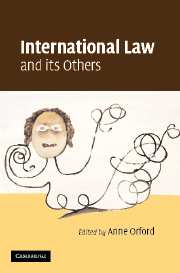Book contents
- Frontmatter
- Contents
- Acknowledgments
- Notes on the contributors
- 1 A jurisprudence of the limit
- PART I Sovereignty otherwise
- PART II Human rights and other values
- PART III The relation to the other
- 10 Completing civilization: Creole consciousness and international law in nineteenth-century Latin America
- 11 From ‘savages’ to ‘unlawful combatants’: a postcolonial look at international humanitarian law's ‘other’
- 12 Lost in translation: re-scripting the sexed subjects of international human rights law
- 13 Flesh made law: the economics of female genital mutilation legislation
- PART IV History's other actors
- Index
11 - From ‘savages’ to ‘unlawful combatants’: a postcolonial look at international humanitarian law's ‘other’
Published online by Cambridge University Press: 20 July 2009
- Frontmatter
- Contents
- Acknowledgments
- Notes on the contributors
- 1 A jurisprudence of the limit
- PART I Sovereignty otherwise
- PART II Human rights and other values
- PART III The relation to the other
- 10 Completing civilization: Creole consciousness and international law in nineteenth-century Latin America
- 11 From ‘savages’ to ‘unlawful combatants’: a postcolonial look at international humanitarian law's ‘other’
- 12 Lost in translation: re-scripting the sexed subjects of international human rights law
- 13 Flesh made law: the economics of female genital mutilation legislation
- PART IV History's other actors
- Index
Summary
Je crois que le droit de la guerre nous autorise à ravager le pays et que nous devons le faire soit en détruisant les moissons à l'époque de la récolte, soit dans tous les temps en faisant de ces incursions rapides qu'on nomme razzias et qui ont pour objectifs de s'emparer des hommes ou des troupeaux … J'ai souvent entendu en France des hommes que je respecte mais que je n'approuve pas trouver mauvais qu'on brûlât les moissons, qu'on vidât les silos et enfin qu'on s'emparât des hommes sans armes, des femmes et des enfants. Ce sont là, suivant moi, des nécessités fâcheuses, mais auxquelles tout peuple qui se voudra faire la guerre aux Arabes sera obligé de se soumettre.
If the goal of the laws of war is to protect all individuals in armed conflict, can one ever be on the ‘wrong’ side of the laws of war? The answer to that question from many international humanitarian lawyers is an emphatic ‘no’. The laws of war protect all; one is always protected under some guise or other. One can never, properly speaking, be considered ‘outside’ the laws of war. International humanitarian law (as the laws of war are interchangeably known) would strongly deny that it had an ‘other’, or that there is anyone that could not be brought within its protective, hyper-inclusive mantle – and one might well be tempted to take it at its word.
- Type
- Chapter
- Information
- International Law and its Others , pp. 265 - 317Publisher: Cambridge University PressPrint publication year: 2006
- 69
- Cited by

